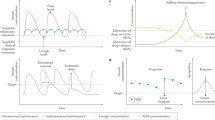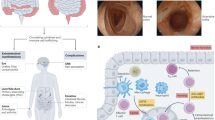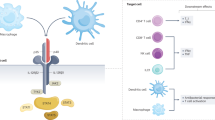Abstract
In the past decade, advances in the understanding of the pathogenesis of inflammatory bowel disease have permitted the development of agents directed against rational therapeutic targets. In particular, various antagonists of tumor-necrosis factor-α have been developed. These include infliximab, adalimumab, certolizumab (CDP870), CDP571, etanercept, and onercept. Clinical trials of these agents have demonstrated varying degrees of clinical efficacy. The use of these agents can be limited by infection, immunogenicity, acute infusion reactions, delayed hypersensitivity reactions, and autoimmune phenomena. This review provides insights into the use of antagonists of tumor-necrosis factor-α for the treatment of inflammatory bowel disease.
Key Points
-
Infliximab is effective in the induction and maintenance of clinical remission in luminal and fistulizing Crohn's disease, as well as in ulcerative colitis
-
Adalimumab and certolizumab are effective in the induction and maintenance of clinical remission in Crohn's disease
-
Potential limitations of the TNF-α antagonists include infection, infusion reactions, autoimmune phenomena, and immunogenicity
-
The capacity to induce apoptosis of TNF-α-expressing cells and neutralization of TNF-α alone are insufficient for clinical efficacy in Crohn's disease
This is a preview of subscription content, access via your institution
Access options
Subscribe to this journal
Receive 12 print issues and online access
$209.00 per year
only $17.42 per issue
Buy this article
- Purchase on Springer Link
- Instant access to full article PDF
Prices may be subject to local taxes which are calculated during checkout

Similar content being viewed by others
References
Bamias G et al. (2005) New concepts in the pathophysiology of inflammatory bowel disease. Ann Intern Med 143: 895–904
Bouma G and Strober W (2003) The immunological and genetic basis of inflammatory bowel disease. Nat Rev Immunol 3: 521–533
Eckmann L and Karin M (2005) NOD2 and Crohn's disease: loss or gain of function? Immunity 22: 661–667
Papadakis KA and Targan SR (2000) Tumor necrosis factor: biology and therapeutic inhibitors. Gastroenterology 119: 1148–1157
Papadakis KA and Targan SR (2000) Role of cytokines in the pathogenesis of inflammatory bowel disease. Annu Rev Med 51: 289–298
Braegger CP et al. (1992) Tumour necrosis factor alpha in stool as a marker of intestinal inflammation. Lancet 339: 89–91
Murch SH et al. (1993) Location of tumour necrosis factor alpha by immunohistochemistry in chronic inflammatory bowel disease. Gut 34: 1705–1709
Heller F et al. (2005) Interleukin-13 is the key effector Th2 cytokine in ulcerative colitis that affects epithelial tight junctions, apoptosis, and cell restitution. Gastroenterology 129: 550–564
Heller F et al. (2002) Oxazolone colitis, a Th2 colitis model resembling ulcerative colitis, is mediated by IL-13-producing NK-T cells. Immunity 17: 629–638
Fossati G and Nesbitt AM (2005) Effect of the anti-TNF agents, adalimumab, etanercept, infliximab, and certolizumab PEGOL (CDP870) on the induction of apoptosis in activated peripheral blood lymphocytes and monocytes [abstract]. Am J Gastroenterol 100: S298
Lugering A et al. (2001) Infliximab induces apoptosis in monocytes from patients with chronic active Crohn's disease by using a caspase-dependent pathway. Gastroenterology 121: 1145–1157
Shen C et al. (2005) Adalimumab induces apoptosis of human monocytes: a comparative study with infliximab and etanercept. Aliment Pharmacol Ther 21: 251–258
Van den Brande JM et al. (2003) Infliximab but not etanercept induces apoptosis in lamina propria T-lymphocytes from patients with Crohn's disease. Gastroenterology 124: 1774–1785
Waetzig GH et al. (2005) Soluble tumor necrosis factor (TNF) receptor-1 induces apoptosis via reverse TNF signaling and autocrine transforming growth factor-beta1. FASEB J 19: 91–93
Hanauer SB et al. (2002) Maintenance infliximab for Crohn's disease: the ACCENT I randomised trial. Lancet 359: 1541–1549
Present DH et al. (1999) Infliximab for the treatment of fistulas in patients with Crohn's disease. N Engl J Med 340: 1398–1405
Sands BE et al. (2004) Infliximab maintenance therapy for fistulizing Crohn's disease. N Engl J Med 350: 876–885
Targan SR et al. (1997) A short-term study of chimeric monoclonal antibody cA2 to tumor necrosis factor alpha for Crohn's disease. Crohn's Disease cA2 Study Group. N Engl J Med 337: 1029–1035
Hanauer SB et al. (2004) A randomized, double-blind, placebo-controlled trial of the human anti-monoclonal antibody adalimumab for the induction of remission in patients with moderate to severely active crohn's disease [abstract]. Gastroenterology 127: a331
Sandborn WJ et al. (2005) Maintenance of remission over 1 year in patients with active Crohn's disease treated with adalimumab: results of a blinded, placebo-controlled study [abstract]. Am J Gastroenterol 100: S311
Sandborn WJ et al. (2005) Remission and clinical response induced and maintained in patients with active Crohn's disease treated for 1-year open-label with adalimumab [abstract]. Am J Gastroenterol 100: S316
Schreiber S et al. (2005) Certolizumab Pegol, a humanised anti-TNF PEGylated Fab' fragment, is safe and effective in the maintenance of response and remission following induction in active Crohn's disease: a Phase III study (PRECiSE). Presented at the 13th United European Gastroenterology Week: 2005 October 15–19; Copenhagen, OP-G-355
Rutgeerts P et al. The Onercept Study Group. (2004) Onercept (recombinant human soluble p55 tumour necrosis factor receptor) treatment in patients with active Crohn's disease: randomized, placebo-controlled, dose-finding phase II study [abstract]. Gut 53: a47
Sandborn WJ et al. (2004) CDP571, a humanised monoclonal antibody to tumour necrosis factor alpha, for moderate to severe Crohn's disease: a randomised, double blind, placebo controlled trial. Gut 53: 1485–1493
Sandborn WJ et al. (2001) Etanercept for active Crohn's disease: a randomized, double-blind, placebo-controlled trial. Gastroenterology 121: 1088–1094
Rutgeerts P et al. (2005) Infliximab for induction and maintenance therapy for ulcerative colitis. N Engl J Med 353: 2462–2476
Baert F et al. (2003) Influence of immunogenicity on the long-term efficacy of infliximab in Crohn's disease. N Engl J Med 348: 601–608
Hanauer SB et al. (2004) Incidence and importance of antibody responses to infliximab after maintenance or episodic treatment in Crohn's disease. Clin Gastroenterol Hepatol 2: 542–553
Cheifetz A et al. (2003) The incidence and management of infusion reactions to infliximab: a large center experience. Am J Gastroenterol 98: 1315–1324
Colombel JF et al. (2004) The safety profile of infliximab in patients with Crohn's disease: the Mayo clinic experience in 500 patients. Gastroenterology 126: 19–31
Lichtenstein GR et al. (2005) Safety of infliximab and other Crohn's disease therapies- updated treat registry data with over 10,000 patient-years of follow-up [abstract]. Gastroenterology 128: a580
Keane J et al. (2001) Tuberculosis associated with infliximab, a tumor necrosis factor alpha-neutralizing agent. N Engl J Med 345: 1098–1104
Lee JH et al. (2002) Life-threatening histoplasmosis complicating immunotherapy with tumor necrosis factor alpha antagonists infliximab and etanercept. Arthritis Rheum 46: 2565–2570
Singh SM et al. (2004) Cutaneous nocardiosis complicating management of Crohn's disease with infliximab and prednisone. CMAJ 171: 1063–1064
Velayos FS and Sandborn WJ (2004) Pneumocystis carinii pneumonia during maintenance anti-tumor necrosis factor-alpha therapy with infliximab for Crohn's disease. Inflamm Bowel Dis 10: 657–660
Warris A et al. (2001) Invasive pulmonary aspergillosis associated with infliximab therapy. N Engl J Med 344: 1099–1100
Vermeire S et al. (2003) Autoimmunity associated with anti-tumor necrosis factor alpha treatment in Crohn's disease: a prospective cohort study. Gastroenterology 125: 32–39
Kwon HJ et al. (2003) Case reports of heart failure after therapy with a tumor necrosis factor antagonist. Ann Intern Med 138: 807–811
Chung ES et al. (2003) Randomized, double-blind, placebo-controlled, pilot trial of infliximab, a chimeric monoclonal antibody to tumor necrosis factor-alpha, in patients with moderate-to-severe heart failure: results of the anti-TNF Therapy Against Congestive Heart Failure (ATTACH) trial. Circulation 107: 3133–3140
Remicade [http://www.remicade.com]
Esteve M et al. (2004) Chronic hepatitis B reactivation following infliximab therapy in Crohn's disease patients: need for primary prophylaxis. Gut 53: 1363–1365
Germano V et al. (2005) Autoimmune hepatitis associated with infliximab in a patient with psoriatic arthritis. Ann Rheum Dis 64: 1519–1520
Michel M et al. (2003) Fulminant hepatitis after infliximab in a patient with hepatitis B virus treated for an adult onset still's disease. J Rheumatol 30: 1624–1625
Brown SL et al. (2002) Tumor necrosis factor antagonist therapy and lymphoma development: twenty-six cases reported to the Food and Drug Administration. Arthritis Rheum 46: 3151–3158
Furst DE et al. (2003) Adalimumab, a fully human anti tumor necrosis factor-alpha monoclonal antibody, and concomitant standard antirheumatic therapy for the treatment of rheumatoid arthritis: results of STAR (Safety Trial of Adalimumab in Rheumatoid Arthritis). J Rheumatol 30: 2563–2571
Weinblatt ME et al. (2003) Adalimumab, a fully human anti-tumor necrosis factor alpha monoclonal antibody, for the treatment of rheumatoid arthritis in patients taking concomitant methotrexate: the ARMADA trial. Arthritis Rheum 48: 35–45
van de Putte LB et al. (2004) Efficacy and safety of adalimumab as monotherapy in patients with rheumatoid arthritis for whom previous disease modifying antirheumatic drug treatment has failed. Ann Rheum Dis 63: 508–516
Keystone EC et al. (2004) Radiographic, clinical, and functional outcomes of treatment with adalimumab (a human anti-tumor necrosis factor monoclonal antibody) in patients with active rheumatoid arthritis receiving concomitant methotrexate therapy: a randomized, placebo-controlled, 52-week trial. Arthritis Rheum 50: 1400–1411
Schreiber S et al. (2005) A randomized, placebo-controlled trial of certolizumab pegol (CDP870) for treatment of Crohn's disease. Gastroenterology 129: 807–818
Sandborn WJ et al. (2001) An engineered human antibody to TNF (CDP571) for active Crohn's disease: a randomized double-blind placebo-controlled trial. Gastroenterology 120: 1330–1338
Bathon JM et al. (2000) A comparison of etanercept and methotrexate in patients with early rheumatoid arthritis. N Engl J Med 343: 1586–1593
Rutgeerts P et al. (2003) Treatment of active Crohn's disease with onercept (recombinant human soluble p55 tumour necrosis factor receptor): results of a randomized, open-label, pilot study. Aliment Pharmacol Ther 17: 185–192
Serono [http://www.serono.com/]
Evans RC et al. (1997) Treatment of ulcerative colitis with an engineered human anti-TNFalpha antibody CDP571. Aliment Pharmacol Ther 11: 1031–1035
Author information
Authors and Affiliations
Corresponding author
Ethics declarations
Competing interests
Gary R Lichtenstein has served as a consultant to Abbott Corporation, AstraZeneca Inc., Axcan, Celltech Inc., Centocor Inc., Elan, Faro Pharmaceuticals, Human Genome Sciences, Proctor and Gamble, Prometheus Laboratories Inc., Protein Design Labs, Protomed Scientific, Salix Pharmaceuticals, Schering-Plough Corporation, Serono, Shire Pharmaceuticals, Smith Kline Beecham Corporation, Solvay Pharmaceuticals, Synta Pharmaceuticals, UCB, and Wyeth. He has received research support from Abbott Corporation, Berlex, Celgene Corporation, Celltech Inc., Centocor Inc., Genetics Institute, Human Genome Sciences, Inkine Inc., Intesco Corporation, ISIS Corporation, Millenium Pharmaceuticals, Otsuka Corporation, Protein Design Labs, Protomed Scientific, and Salix Pharmaceuticals. He has served on the Speakers Bureau for AstraZeneca, Axcan, Centocor Inc., Faro Pharmaceuticals, Proctor and Gamble, Salix Pharmaceuticals, Schering-Plough Corporation, Shire Pharmaceuticals, and Solvay Pharmaceuticals. He has received an honorarium from Falk Pharma.
Rights and permissions
About this article
Cite this article
Chang, J., Lichtenstein, G. Drug Insight: antagonists of tumor-necrosis factor-α in the treatment of inflammatory bowel disease. Nat Rev Gastroenterol Hepatol 3, 220–228 (2006). https://doi.org/10.1038/ncpgasthep0447
Received:
Accepted:
Issue Date:
DOI: https://doi.org/10.1038/ncpgasthep0447
This article is cited by
-
Certolizumab pegol
Nature Reviews Drug Discovery (2008)
-
Fatal miliary Coccidioidomycosis in a patient receiving infliximab therapy: a case report
Journal of Medical Case Reports (2007)
-
Therapy Insight: how the gut talks to the joints—inflammatory bowel disease and the spondyloarthropathies
Nature Clinical Practice Rheumatology (2007)
-
Treatment with biologic therapies and the risk of cancer in patients with IBD
Nature Clinical Practice Gastroenterology & Hepatology (2007)
-
Effects of Tumour Necrosis Factor-α on Human Sperm Motility and Apoptosis
Journal of Clinical Immunology (2007)



